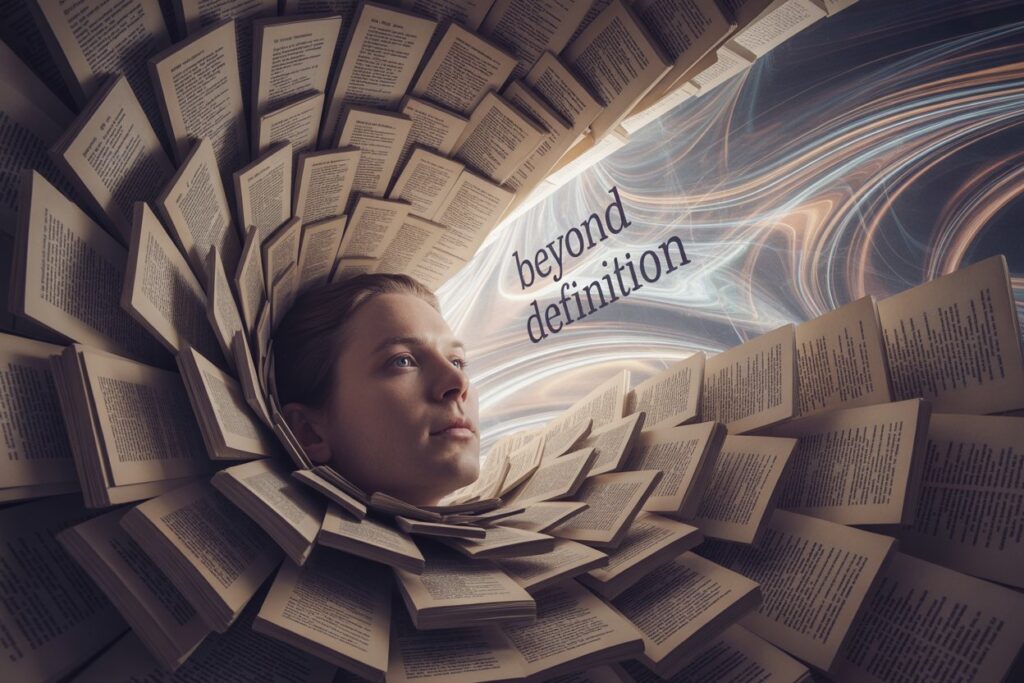Words are the foundation of communication, yet their definitions are often perceived as something unshakable, as if they’re absolute truths. However, relying on word definitions as the final truth is a mistake. A definition is always a framework — limited by context, culture, personal perception, and the era in which it appears. Let’s explore why this is the case and why blind faith in dictionary definitions can easily lead to misunderstanding.

Contents
1. Words Are Subjective: Everyone Brings Their Own Meaning
Every person brings their own experience, emotions, and associations to any word they encounter. Even if a dictionary provides a precise definition, different people may perceive the same word in entirely different ways. For example, the dictionary might describe “love” as a strong feeling of affection or attraction. But for one person, love means passion and romance; for another, it’s about care and self-sacrifice; for a third, it’s something else entirely, shaped by their unique experience. Even the most accurate formulations cannot account for all the nuances of individual perception. This makes definitions not universal truths, but merely signposts.
2. Definitions Are the Product of Human Thought
Dictionary definitions don’t fall from the sky. They’re created by people — linguists, philosophers, scholars — shaped by their time, their culture, and their worldview. For instance, the word “freedom” in the 18th century may have been associated with political independence; in the 20th century, with personal autonomy; and today, it might include digital freedom or freedom of expression on social media. Each definition reflects only the viewpoint of its creator at a specific historical moment. It’s neither eternal nor absolute.
Take the word “planet.” Until 2006, Pluto was considered a planet, enshrined in scientific definitions. But then the International Astronomical Union revised the definition of “planet,” and Pluto no longer fit, becoming a “dwarf planet” instead. This is an example of how a definition, once thought scientific and irrefutable, turned out to be conditional and subject to change.
3. Definitions Evolve
Language is a living organism — it’s constantly changing. Words that mean one thing today may mean something completely different tomorrow. For example, the Russian word «крутой» (“krutoj”) once meant something steep, like a hillside or a sharp turn; today, it’s more commonly used to mean “cool,” “impressive,” or “awesome.” If we blindly relied on the old definition, we would miss the contemporary context.
Another example is the word “gay.” In 19th-century English, it meant “cheerful” or “happy.” Over time, its meaning shifted, and today it is primarily associated with sexual orientation. Someone relying on the old dictionary definition risks misunderstanding modern texts or conversations.
4. Definitions as Frameworks: Limitation and Context
A dictionary definition is an attempt to fit a complex concept into just a few words. But reality is always more complicated. For example, the word “justice” might be defined as “conformity with moral and legal principles.” However, in different cultures, religions, or even social groups, justice is understood in very different ways. For some, it means equality; for others, it’s giving each person what they deserve; for others still, it’s about following divine commandments. A dictionary definition can’t encompass all these aspects, and using it as ultimate truth limits thinking.
5. Blind Faith in Definitions as Pseudo-Scientific
Many people mistakenly believe that leaning on dictionary definitions gives their arguments a sense of scientific rigor or objectivity. But this is an illusion. For example, in debates about what “art” is, people often refer to the dictionary, where art is described as “creative activity aimed at producing aesthetically significant objects.” But this definition does not resolve disputes about whether graffiti is art or not, because it doesn’t account for subjective criteria of aesthetics and cultural context. Relying on the dictionary in such cases means oversimplifying reality into a framework that is not always applicable.
6. Real-Life Examples
- The word “democracy”: In the dictionary, democracy is a form of government in which power belongs to the people. But in real life, this word sparks endless debate. For some, democracy is about elections; for others, it’s about freedom of speech; for others still, it’s about social equality. If you rely only on the dictionary definition, you risk missing the heart of political discussions.
- The word “success”: For one person, success means wealth; for another, a happy family; for a third, self-fulfillment. The dictionary definition (“the achievement of a goal”) is too general to serve as a universal yardstick.
- The word “science”: Science may seem to be objective knowledge based on facts, but even this word changes meaning: in the Middle Ages, alchemy was considered science; today it is seen as pseudoscience.
Conclusion
Relying on word definitions as final truth is to confine your thinking within the boundaries set by others, at a particular moment in time. Words are tools, not absolutes. They help us communicate, but their meaning depends on context, personal experience, and the evolution of language. To understand the world more deeply, we need to look beyond dictionary definitions, consider nuance, and be ready for meanings to change. After all, words are just an attempt to describe reality — not reality itself.